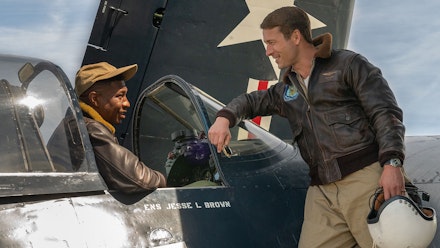Perhaps in a year where Top Gun: Maverick didn’t dominate the global box office, J.D. Dillard’s gem of a movie would have got more attention. While Maverick popped up in end-of-year lists as one of the best films of 2022, Devotion landed as a direct-to-streaming release on Amazon Prime with little to no fanfare. Plenty of comparisons can be made between the two films: both capture the high-risk thrill of aviation and the perils of life-and-death dogfights. Both films share the natural charm of Glen Powell, an actor who can light up any screen. Both, too, share the same flight designer in Kevin LaRosa, Hollywood’s favoured aerial expert. But the importance of Jesse Brown’s story — the first African-American naval aviator — comes at a much-needed time in showcasing how Black stories (especially heroic, historical accomplishments) have been hidden or erased from the history books. It makes for a different type of war movie.

Change is in the air when we first meet Brown (Jonathan Majors) and Hudner (Powell) at Quonset Point Naval Air Station. As America prepares itself to enter yet another war, this time in Korea, the assigned pilots of the VF-32 squadron begin testing out the Navy’s new arsenal in their weaponry: the F4U-4 Corsair aircraft.
Make no mistake: it's Jonathan Majors' exceptional performance that drives Devotion.
If that sounds dry, it plays as a hugely immersive cinematic experience, carefully crafted by Dillard and his cinematographer Erik Messerschmidt; the first flight between Brown and Hudner as wingmen is captured with passion and grace. When the film lands on the ground, it re-focuses on Jesse’s family, with Christina Jackson as his wife, Daisy, taking centre stage. Even with the ugliness of racism and segregation, there is room to celebrate Black lives shared through joy and love.
Dillard’s film does have its occasional stumbles. Aside from a few VFX shots and a script that could have taken more chances in its story depth, the rest of the VF-32 squadron (which includes Joe Jonas’ Marty Goode) are portrayed without any real distinction to their personalities. Powell gets a little more to do as Hudner, delivering a compelling turn while earning Brown’s trust and support.
But make no mistake: it's Jonathan Majors' exceptional performance that drives Devotion. There's a lot of emotional complexity here: resilience, excelling against the odds, the personal struggle of being Black in the 1950s military. At times, his character arc is euphoric: one scene depicts a Black Naval crew watching in awe as Brown lands his Corsair aircraft on the USS Leyte to pass his carrier test, showing how being ‘the first’ can inspire. At other times, the vicious mental scarring of a man haunted by every racial slur and aggression imaginable is used as a tearful self-motivation, Brown facing himself in the mirror. Even with the most minimalist material, Majors extracts every bit of nuance to make you feel invested in his character — right up to the film's powerful end.
